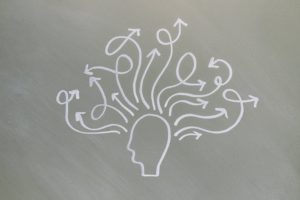Obsessive-compulsive disorder (OCD) and attention deficit hyperactive disorder (ADHD) are two different conditions that overlap in acute symptoms. This can make diagnosis tricky, which is important to get treatment. being familiar with the similarities and differences between them can allow individuals to be more informed in the management of their condition.
The Basics of OCD
OCD causes a person to have obsessive, intrusive thoughts and/or compulsions, usually about specific themes. Compulsions can manifest as physical behaviors or mental acts that must be performed to provide a sense of temporary relief from the anxiety caused by disturbing thoughts. Individuals are typically aware that their thoughts and behaviors are irrational, but they cannot control them despite efforts.
It is thought that OCD develops partly due to a deficiency of serotonin in regions of the brain. Its exact pathology is still being explored. This neurotransmitter has many functions, including the regulation of mood.
OCD can cause other issues like:
- anxiety
- depression
- suicide attempts
- lower quality of life
- avoidance of social interactions
The Basics of ADHD
ADHD is a neurodevelopmental disorder that involves the impairment of the brain’s ability to perform executive functions. The main features of ADHD are developmentally inappropriate levels of inattention, hyperactivity, and impulsivity. For instance, an individual with ADHD may experience:
- forgetfulness
- inability to concentrate
- poor time management
- trouble completing tasks
- hyper-focusing on activities
- becoming easily overwhelmed
- the need for certain types of stimulation
ADHD can lead to complications such as:
- loss of jobs
- academic troubles
- engaging in risky behaviors
- problems regulating emotions
- troublesome social interactions (being labeled “the trouble maker”)
Difficulty Paying Attention
The manifestations of OCD and ADHD can be strikingly similar, although they occur for different reasons.
For example, an individual with OCD might have trouble completing work because they are battling fearful thoughts or worries. They may seem to be inattentive or distractable when really, they just cannot get their mind to calm down. An individual with OCD may avoid or become inattentive to stimuli that cause stress and anxiety, whereas a person with ADHD will hyperfocus on a stimulating task and can even lose track of time.
Typical OCD manifestations such as cleaning and organizing items can actually be a coping mechanism for those with ADHD. Individuals with ADHD can become overstimulated and distracted when things in their environment are disorganized, which can trigger anxiety.
Trouble Making Decisions
A person with OCD may have difficulties making decisions because they overthink the problem repeatedly. They may also have deficiencies in their working memory and ability to plan because they cannot filter pertinent information from what is irrelevant. Planning and executing translate to many projects being started but very few finished, which can become increasingly frustrating.
They may feel the need to fully capture all relevant details to grasp the concept, which can be overwhelming. Individuals with OCD also tend to spend significant time carefully planning, which can hinder action. By contrast, a person with ADHD may have trouble making decisions due to impulsivity.
Similarities Between the Two
OCD and ADHD share a few other similarities. Both disorders:
- can run in families
- have high comorbidity with each other
- may involve deficits in similar brain networks
- can lead to mental health issues if unmanaged
- can cause difficulties in social, academic, and work settings
- tend to be chronic disorders with persistent rates of ~40–50%
Treatment for OCD
OCD can be successfully managed with treatment. This typically includes a combination of psychotherapy and medication.
Cognitive behavior therapy is all about the relationship between one’s thoughts, feelings, behavior, and emotions. CBT helps clients learn techniques that retrain the brain to recognize and control obsessive thoughts and compulsive behaviors. With practice, clients can begin to develop a more positive way of thinking and reacting to negative stimuli.
Selective serotonin reuptake inhibitors (SSRIs) may be prescribed to increase the levels of serotonin in the brain which are naturally lower in individuals with OCD.
Can OCD & ADHD Co-Occur?
Some individuals have OCD and ADHD simultaneously. While ADHD presents as decreased activity, OCD is associated with increased activity in similar brain regions. This is important for treatment because medications prescribed for OCD (SSRIs) and ADHD (stimulants) can cause complications in clients when given together.
Stimulants can make OCD symptoms worst by causing a person to focus on obsessive thoughts even more. This all depends on the way the condition presents itself in each unique individual.
It is essential to discuss the possibility of having both conditions with a clinician. Treatment for OCD can be ineffective if ADHD is present but left untreated.
OCD and ADHD are two very different disorders that sometimes present in almost identical ways. Understanding their similarities and differences is vital for receiving the correct diagnosis and proper treatment. Avalon Malibu is a California state-licensed residential addiction and mental health treatment center for adults. We pride ourselves on taking a client-centered approach to treat mental health conditions such as Obsessive-Compulsive Disorder. This means that our clients’ needs and well-being are our top concerns. We understand the challenges of OCD and ADHD and how difficult it can be to distinguish between the two. Our knowledgeable clinicians will work closely with you to determine your diagnosis and provide you with therapeutic options to manage the condition. Cognitive-behavioral therapy (CBT) is particularly beneficial for clients with OCD. Our goal is to help you find happiness and stability again. To learn more about our program, please call us today at (844) 857-5992.












